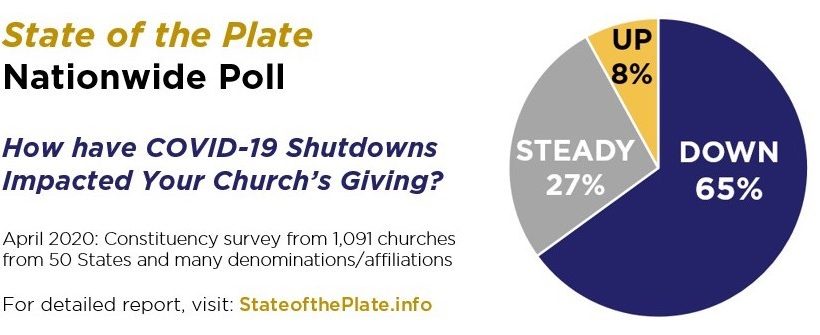Church Giving Down More Due to COVID-19 Than During Recession, Survey Shows

Sixty-five percent of churches have seen a decline in giving since mid-March as congregations have halted in-person services due to the coronavirus, according to a new survey.
The “State of the Plate” survey released Wed., Apr. 22, by the National Association of Evangelicals found that a third of churches — 34 percent — reported that giving had dropped between 10 and 20 percent. About 1 in 5 churches (22 percent) said the decline was between 30 and 50 percent. Almost a tenth of churches (9 percent) reported a drop of 75% or more in giving to their congregations.
Just 8 percent of churches said giving had increased, and 27 percent reported steady offerings.
The survey conducted between April 8 and April 20 of 1,091 mostly Protestant churches in the U.S. asked church leaders how COVID-19 shutdowns affected their church’s giving. The research involved participants such as Christianity Today’s Church Law & Tax and the NAE Financial Health initiative.
Brian Kluth, who started the State of the Plate research after the 2008 financial crisis, predicted that the findings could lead to tighter budgets for congregations and their staff members.
“What’s surprising is they’re much deeper and far-reaching than what happened in the recession,” he said in an interview, referring to the Great Recession in the late 2000s. “This is a major shift, a short-term shift in the financing of churches right now in America.”
In the 2010 State of the Plate survey, 38% of churches reported that general church giving in 2009 was down compared with the previous year. Thirty-five percent said giving was up and 27 percent said contributions were flat.
While the new research found greater declines in giving, almost half (48%) of churches that responded to a question about online viewing of their worship services said it had grown to double or more of their regular in-person attendance.
“There’s more online viewing that is going on than ever before,” Kluth said.
Kluth, who also is the national spokesman for the NAE’s Bless Your Pastor movement, has encouraged churches to find practical ways to show appreciation to pastors and church staffers. Bless Your Pastor features a list of 50 ways to do that and is offering church participants steps — including taking an appreciation offering for their pastor — that could lead to a grant-funded gift card of $250 for their senior pastors.
In-kind offers of help to clergy and church staffers will now be key as congregations work to recover from the financial effects of COVID-19, he said.
“That’s going to be really important this year because a lot of churches are going to see their budgets affected and their payroll,” Kluth said. “So if you’re a barber, cut their hair; if you’re a mechanic, fix their car; if you grow vegetables, share your vegetables.”
Other research has shown that church closures due to the coronavirus have affected the bottom line of many churches.
A Billy Graham Center/Exponential/Leadership Network survey released Tuesday found that 60% of pastors have seen a decrease in giving.
“Most concerning is the 11 percent of pastors and leaders who replied that giving was down by at least 50 percent,” the report reads. Nevertheless, that research also showed that a majority of church leaders reported optimism about their financial situations.
Barna surveyed pastors in late March and found that almost 8 in 10 (79 percent) reported financial giving had decreased, with close to half (47 percent) saying it had dropped “significantly.”
Barna also found that a bit more than half of pastors (54 percent) said online attendance on March 29 was higher than regular in-person attendance, with a quarter of them describing it as “much higher.”



